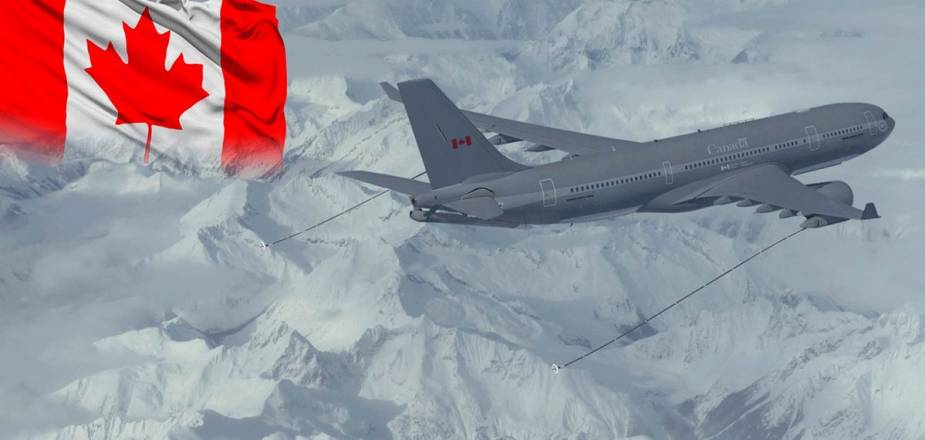Breaking news
Royal Canadian Air Force to get two Airbus A330-200 strategic tankers.
On July 14, Defence Minister Anita Anand announced that Canada has finalized a contract to acquire the first two aircraft for the Royal Canadian Air Force (RCAF) that will replace and renew the capability currently fulfilled by the CC-150 Polaris fleet and later become part of the Strategic Tanker Transport Capability (STTC) fleet.
Follow Air Recognition on Google News at this link
 The contract for the procurement and preparation of two Airbus A330-200 aircraft, manufactured in 2015, was awarded to International AirFinance Corporation and is valued at $102M USD (taxes excluded). (Picture source: RCAF)
The contract for the procurement and preparation of two Airbus A330-200 aircraft, manufactured in 2015, was awarded to International AirFinance Corporation and is valued at $102M USD (taxes excluded). (Picture source: RCAF)
The contract for the procurement and preparation of two Airbus A330-200 aircraft, manufactured in 2015, was awarded to International AirFinance Corporation and is valued at $102M USD (taxes excluded).
Since 1992, the CC-150 Polaris aircraft and its crews have provided outstanding service to Canada. The Polaris is the aircraft that provides the majority of air-to-air refueling for the Royal Canadian Air Force’s fighter fleet, allowing the RCAF to extend their range and operating time. This capability has seen extensive use at home and abroad, including on Operation IMPACT, where it delivered more than 65 million pounds of fuel to coalition aircraft. The fleet also fulfills many other roles, including military personnel and cargo airlift; strategic Government of Canada personnel transport; and medical evacuations.
After nearly 30 years of outstanding service, the RCAF is looking to the future of this crucial capability, and with today’s announcement, we are moving forward to the next step of the Strategic Tanker Transport Capability (STTC) project.
This project, which is Initiative #47 of Canada’s defence policy, Strong, Secure, Engaged (SSE), will replace and renew the RCAF’s air-to-air refueling capability for the next generation.
The STTC project, within its currently approved scope, will acquire sufficient aircraft to provide the RCAF with three continuous lines of tasking to deliver on Canada’s defence policy, to defend Canadians, to meet Canada’s NORAD and NATO commitments, and allow our Canadian Armed Forces to continue to contribute to peace and stability abroad through their operations.
The STTC aircraft will also be equipped to airlift large numbers of CAF personnel and their equipment in support of operations and training activities within Canada, including in Canada’s Arctic regions, and around the world, which will enhance the existing transport capacity provided by the CC-177 Globemaster and CC-130J Hercules fleets, allowing for the more efficient movement of personnel and equipment. And, as a multi-role aircraft, the STTC aircraft will provide the RCAF with increased flexibility, allowing planners to select the most appropriate aircraft for a specific airlift mission, and it will increase the RCAF’s ability to respond to unexpected operational requirements, such as domestic or international emergencies or humanitarian relief missions.
The exact number of aircraft in the Strategic Tanker Transport Capability fleet is currently anticipated to be six aircraft (including these two Airbus A330-200 aircraft). These two commercial aircraft will later be modified by Airbus Defence and Space to military specifications required to serve as multirole aircraft within the STTC fleet, and they will play an integral role in providing air-to-air refuelling, strategic airlift, aeromedical evacuations, and strategic Government of Canada personnel transport, including transport of the Prime Minister, Governor General, and others, for decades to come.
Anita Anand, Canadian Minister of National Defence, said: “The Government of Canada is committed to providing the Canadian Armed Forces with the equipment they need at the best value for money. We look forward to accepting these two aircraft as they represent an important first step in eventually replacing the capability currently provided by the CC150 Polaris fleet.”
Filomena Tassi, Minister of Public Services and Procurement Canada, said: “Providing our Canadian Armed Forces members with safe, advanced equipment to protect Canadians is of paramount importance. These aircraft will support key airlift operations by the Royal Canadian Air Force, while providing best value for Canadians.”
Quick facts
These two used A330-200 aircraft, manufactured in 2015, are being procured at the best value for money for Canadians and they will meet the requirements of the Royal Canadian Air Force for decades to come. The modification to transform a commercial Airbus A330-200 into a strategic tanker, named by Airbus the Multi-Role Tanker Transport (MRTT), can be applied to either new or used aircraft. Several allied nations have procured used A330-200 aircraft and have worked or are working with Airbus to convert those aircraft to the MRTT configuration to support their operations. All modifications, whether for new or used aircraft, will be completed through the Government’s contract with Airbus.
Ten-year average CC-150 Polaris Mission type:
• Air-to-Air Refuelling: 30%
• Strategic Airlift for the RCAF: 55%
• Strategic Government of Canada Transport: 10%
• Aeromedical: 5%
The aircraft are expected to arrive in Canada in winter 2023, where they may be placed into early service in passenger/cargo roles as we await their modification to military specifications. The aircraft being purchased are currently configured for long-haul commercial use. These aircraft may initially be used to perform cargo, troop and passenger airlift operations. This could include, for example, the deployment of CAF troops and gear within Canada or overseas, the movement of civilian passengers in support of humanitarian relief operations, and transport of the Prime Minister, Governor General, and others.
The Industrial and Technological Benefits (ITB) Policy, including the value proposition, will apply to this project to leverage economic benefits for Canada equal to the value of the contract. Through the ITB Policy, the STTC project will leverage investments and business activities in support of Canada’s key industrial capabilities – supporting the defence industry and good Canadian jobs in regional economies.


























